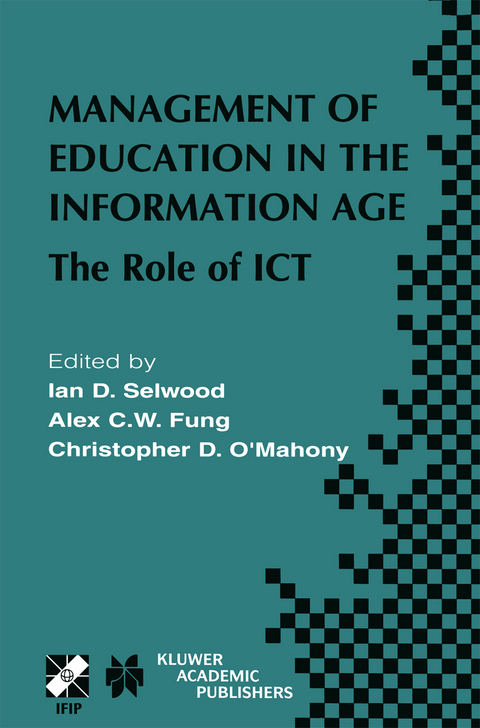
Management of Education in the Information Age
Springer-Verlag New York Inc.
978-1-4757-1037-3 (ISBN)
At two previous conferences of Working Group 3. 7, the evaluation of the implementation of computerised school information systems (SISs) in Hong Kong and The Netherlands were presented. Here, we will present the results of similar research in England. The rationale for these studies was to fill the gap in our knowledge on this important type of computer use in schools, and, by that, to gain insight into the factors that prove to promote successful SIS implementation. In England SIMS (School Information Management System) has the largest market share of computerised school administration systems. SIMS is a modular but integrated system in that once entered, data is available between modules. Briefly, SIMS consists of about twenty modules that support the work of clerical staff and school managers and teachers (for details see Wild & Walker 2001). 2. RESEARCH QUESTIONS AND RESEARCH FRAMEWORK The following questions were addressed: - The extent of, and ways in which SIMS was used in schools; - The user opinion on the quality of SIMS; The nature and effects of the implementation process, and the characteristics of the schools into which SIMS was introduced; - Factors affecting the degree of SIMS use. The variables relating to the above issues that were investigated in this study fell into five distinct categories according to Visscher's model (see Figure 1), i. e. , features of SIMS use, the implementation process, school organisation, and the intendedlunintended effects. The study assumed possible interrelationships between all these variable groups.
Management of Education in the Information Age.- Section 1— ICT for Managing Student Learning.- Management and the Use of ICT in Subject Teaching.- Data Use in the Classroom.- Section 2 — ICT for Managing Educational Institutions.- The Results of Implementing SIMS in English Secondary Schools.- The Implementation of ITEM in Botswana.- The Impact of ICT on the Work of the School Principal.- Information Technology and Control in Educational Management.- Involving the Academic.- Portal Technology for Integrated, User-Centric University Information Systems.- Section 3 — The Management of e-Learning.- Fostering Web Based Teaching and Learning in a University.- Learner and Course Interoperability in a Web Based Training Model.- Collaborative Work Tools in Learning Environments.- Section 4 — ICT Training for Educational Professionals.- Managing ICT Access and Training for Educators.- Assessing the ICT Training Conditions for Educational Managers.- Managing Learning Environments in Schools.- Section 5 — Reports from Discussion Groups.- The Management of e-Learning.- Management Systems in the Classroom.- Core Competences for ITEM.- Index of contributors.- Key word index.
| Erscheint lt. Verlag | 20.7.2012 |
|---|---|
| Reihe/Serie | IFIP International Federation for Information Processing ; 120 |
| Zusatzinfo | X, 210 p. |
| Verlagsort | New York, NY |
| Sprache | englisch |
| Maße | 155 x 235 mm |
| Themenwelt | Sachbuch/Ratgeber ► Natur / Technik ► Garten |
| Schulbuch / Wörterbuch ► Unterrichtsvorbereitung ► Unterrichts-Handreichungen | |
| Geisteswissenschaften ► Psychologie ► Pädagogische Psychologie | |
| Informatik ► Software Entwicklung ► User Interfaces (HCI) | |
| Mathematik / Informatik ► Informatik ► Theorie / Studium | |
| Sozialwissenschaften ► Pädagogik ► Schulpädagogik / Grundschule | |
| ISBN-10 | 1-4757-1037-2 / 1475710372 |
| ISBN-13 | 978-1-4757-1037-3 / 9781475710373 |
| Zustand | Neuware |
| Haben Sie eine Frage zum Produkt? |
aus dem Bereich


